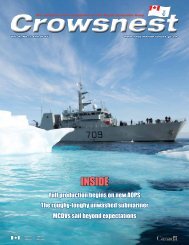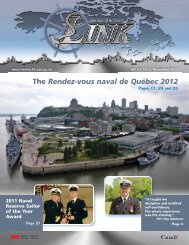You also want an ePaper? Increase the reach of your titles
YUMPU automatically turns print PDFs into web optimized ePapers that Google loves.
hi<strong>the</strong>rto untapped treasure trove, Russian leaders are eager that <strong>the</strong>ir country benefit from <strong>the</strong><br />
enormous resources <strong>the</strong>re, much <strong>of</strong> which lies within Russian territory, sovereign waters or <strong>the</strong><br />
EEZ. 277 Western economic sanctions <strong>and</strong> falling energy prices are undermining Russia’s ability to<br />
afford its long-term aims. While <strong>the</strong>y could delay Moscow’s timetable for <strong>the</strong> region, <strong>the</strong>y appear<br />
to be fortifying Russia’s resolve to advance its own Arctic development agenda.<br />
Admittedly, <strong>the</strong> size <strong>of</strong> <strong>the</strong> deployments <strong>and</strong> <strong>the</strong> capabilities involved are far below Cold War<br />
levels <strong>and</strong> <strong>the</strong> emergence <strong>of</strong> a harder line in Moscow’s Arctic policy was already evident before<br />
<strong>the</strong> current tensions. As early as mid-2007, for example, Russia reintroduced long-range air<br />
patrols over <strong>the</strong> Arctic Ocean. In 2008, <strong>the</strong> comm<strong>and</strong>er <strong>of</strong> <strong>the</strong> Russian Navy publicly mused about<br />
<strong>the</strong> potential for a “redistribution <strong>of</strong> power up to armed intervention”, <strong>and</strong> <strong>the</strong> following year<br />
Moscow’s declared Arctic policy emphasised securing sovereignty over its strategic resources in<br />
<strong>the</strong> region <strong>and</strong> ensuring exclusive control over <strong>the</strong> NSR. 278 Five years later, following <strong>the</strong> rapid<br />
deterioration <strong>of</strong> Russia’s relations with <strong>the</strong> West, Putin announced a much larger increase in <strong>the</strong><br />
military presence in <strong>the</strong> region in order “to have all <strong>the</strong> levers for <strong>the</strong> protection <strong>of</strong> its security <strong>and</strong><br />
national interests.” 279 Since <strong>the</strong>n, <strong>the</strong> military buildup in <strong>the</strong> Arctic has continued with <strong>the</strong><br />
establishment <strong>of</strong> a new joint forces strategic comm<strong>and</strong> that is slated to include two mechanised<br />
infantry brigades (by 2016), ten military airfields, <strong>and</strong> <strong>the</strong> integration <strong>of</strong> <strong>the</strong> Russian Navy’s<br />
Nor<strong>the</strong>rn Fleet. 280 And, in early-April 2015, Moscow conducted a large-scale parachute drop near<br />
to <strong>the</strong> North Pole, an action that was likely intended to assert Russian maritime boundary<br />
claims. 281 <strong>The</strong> harder policy line, as well as a presumed incursion <strong>of</strong> a Russian submarine in<br />
Sweden’s territorial waters in mid-2014, threats made by Russia’s ambassador in Denmark in<br />
early-2015 about that country’s participation in sea-based ballistic missile defence system, <strong>and</strong><br />
reporting that Russian <strong>of</strong>ficials are taking an increased interest in Norway’s coastal waters, are,<br />
feeding a growing sense <strong>of</strong> unease. 282 This will almost certainly continue as <strong>the</strong> strategic<br />
competition associated with a slowly emerging multi-polar system takes shape. As it does, <strong>the</strong><br />
importance <strong>of</strong> <strong>the</strong> Arctic as a strategic region—for power projection <strong>and</strong> as a bastion for Russia’s<br />
sea-based deterrent—will steadily grow. As one commentator has written, “most analysts have<br />
long concluded that <strong>the</strong> Arctic’s future would be dominated by economic development <strong>and</strong><br />
international cooperation, [but] thanks to Russia’s most recent behaviour in <strong>the</strong> region, such a<br />
conclusion is no longer so certain.” 283<br />
277 Pavel K. Baev, “Trouble-Making <strong>and</strong> Risk-Taking: <strong>The</strong> North in Russian Military Activities” in<br />
Elana Wilson Rowe (ed.), Russia <strong>and</strong> <strong>the</strong> North (Ottawa University Press, 2009), pp. 21–25.<br />
278 Hart et al., Chill Out, p. 4. See also Katarzyna Zysk, “Russia’s Arctic Strategy”, Joint Forces Quarterly,<br />
Issue 57, April 2010, pp. 107–108.<br />
279 “Putin orders Arctic military build-up in 2014”, RT.com, 10 December 2013 [accessed on<br />
21 August 2014 at http://rt.com/news/arctic-russia-military-putin-000/].<br />
280 “Transfer <strong>of</strong> Troops to <strong>the</strong> New Comm<strong>and</strong> in <strong>the</strong> Arctic Region will be Completed by December 15”,<br />
ITAR-TASS, 10 December 2014, <strong>and</strong> Tim Ripley, “Russia to build more Arctic airfields”, Jane’s Defence<br />
Weekly, 21 January 2015, p. 13.<br />
281 “Machtdemonstration: Russische Fallschirmjäger l<strong>and</strong>en auf Eisscholle in der Arktis“, Der Spiegel,<br />
7 April 2015.<br />
282 See, for example, <strong>The</strong>rese Doksheim, “Norwegian Police Intelligence Warned <strong>of</strong> Russian Information-<br />
Ga<strong>the</strong>ring Along Norwegian Coast”, Dagbladet.no (Oslo), 28 February 2015.<br />
283 Stephen Blank, “<strong>The</strong> Russian Arctic: Between Economic Development <strong>and</strong> Accelerating Militarization”,<br />
Eurasian Daily Monitor, 7 November 2014.<br />
60 DRDC-RDDC-2016-R085




